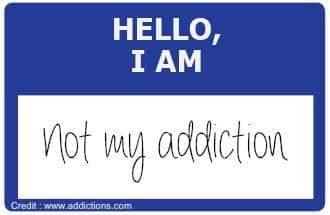Mental illness and addiction tend to have a stigma attached, which causes other people to lack compassion. Likewise, the stigma surrounding these conditions can prevent people from seeking treatment. People who suffer from mental health and substance use disorders often say that the shame and humiliation they experience discourages them from getting help and ends up making their issues worse. Others also have difficulty finding a job or a place to live, maintaining relationships and so on.
The stigma can be so severe that people living with a mental health condition or addiction say that it is worse than the symptoms they experience. Stigma can also worsen a person’s mental health problem, trapping them in a vicious cycle of illness.
What does Stigma Mean?
Stigma initially described a physical mark of shame. However, it now includes an invisible mark that makes a person different from others. The issue with the term ‘stigma’ is that it focuses on the person’s difference instead of the people who are putting them apart. The word stigma also doesn’t bring up the same reaction as racism, sexism or homophobia, even though it is comparable.
Stigma is essentially prejudice, for holding negative beliefs or attitudes about people who are seen as different, and discrimination, by acting on these beliefs or ideas. For example, society tends to have stereotyped views about addiction and mental illness. Mental illness stigma involves people thinking that those with mental illness are dangerous and violent towards others. In reality, they have a higher risk of being attacked or even harming themselves rather than others.
What is Mental Illness Stigma?
Mental illness stigma can be split into two distinct forms: social stigma and perceived stigma. Social stigma is described by prejudicial outlooks and discriminating behaviour towards people who have mental health issues because of the psychiatric label that has been given to them. On the other hand, perceived stigma occurs when the mental health sufferer internalises their views of discrimination. Perceived stigma can drastically cause feelings of shame and result in weaker treatment results.
When it comes to social stigma, studies suggest that stigmatising attitudes regarding individuals with mental illness are common and widespread. It is a commonly held belief that individuals with mental health issues are dangerous. Another popular theory is that mental health issues are self-inflicted. Finally, many believe that people with mental illness are more difficult to talk to. People tend to believe these ideas regardless of their age, prior knowledge surrounding mental illness and even if they know a person who suffers from mental illness.
Who has Stigmatising Beliefs about Mental Illness?
What may come as a surprise is that stigmatising beliefs about people with mental health issues are held by a wide variety of people in our society. For example, one study found that stigma towards adolescents with mental illness can come from family members, peers and teachers. 46% of these adolescents explained stigmatisation by family members in the form of unjustified assumptions, avoidance, distrust, gossip and pity. Additionally, 62% experienced stigma from peers, which often resulted in social rejection and friendship loss.
What Factors Cause Mental Illness Stigma?
The social stigma linked with mental illness has several causes. Throughout history, individuals with mental health issues have been treated differently, rejected and even abused. This treatment may be a result of misguided views that people with mental illness are more unpredictable or violent than others without such issues, or that they are somehow different overall, even though those beliefs are not based on fact.
Likewise, early beliefs about the origins of mental illness, such as spirit or demonic possession, also contributed to reactions of fear, caution and discrimination. Additionally, the media continues to play a role in spreading stigmatising stereotypes of individuals with mental health issues.
What is The Stigma of Addiction?

A significant challenge for individuals who have an addiction to alcohol or drugs is facing and overcoming the stigma of addiction. Addiction is a disease that can be treated through proper treatment methods including behavioural therapy, skill development, medication and more. However, many people see addiction as a weakness in an individual or a character flaw.
Unfortunately, overcoming an addiction is not that easy. There are many factors that contribute to why an individual keeps using substances regardless of the negative consequences.
The Dangers of Stigmas and Stereotypes
Various stereotypes come to mind when people think about those who are dependent on alcohol or drugs. Most of these stereotypes involve negative assumptions regarding a person’s lifestyle that includes alcohol and drugs. Individuals who abuse substances are usually seen as deviants and not involved in society in the same way others are. People think they have different values, which leads to unemployment, neglecting education and prostitution. They also imagine them robbing people, taking drugs in dark places, going on binges and so on.
In reality, most of the people who are addicted to drugs and alcohol behave like members of mainstream society. They are parents, relatives, friends and colleagues. Aside from their addiction, they lead regular lives that involve work, relationships and a social life. Of course, some cannot manage their addiction, so they end up reflecting the stereotype, but that is not true for many addicts. It is also worth noting that addiction does not discriminate and can affect any person, regardless of age, gender, status, etc.
People who interact with a person with an addiction may believe their own stereotypes. For example, an employer may believe that an alcoholic cannot be trusted and fire them from their job. Many people with a substance abuse problem can exist in society without causing any problems for other people. Substance abusers tend to deny their problems and keep it a secret from others because they do not want to be discriminated against.
They will experience the shame that comes with the stereotype and become damaged by the constant negative associations of addiction. They may also battle addiction for much too long without seeking treatment due to the severe consequences.
How does Stigma Affect Treatment?
Many people struggling with addiction and mental illness do not seek treatment due to the stigma that surrounds their conditions. A person who shares details of their situation at work might fear being rejected by colleagues or even being fired. When deciding to go into treatment, a major concern that comes up is how to assimilate back into home and work settings. The individual may be watched and monitored, or feel as though that is happening, which causes pressure and stress when they try to return to regular life following treatment.
Fear of being judged can keep people in the cycle of addiction and stop them from getting the help that could improve their lives. For people who do seek treatment, these beliefs can be a trigger, which can result in relapse.
Examples of Why People do not Seek Treatment Due to Stigma
Medical professionals and their patients are often affected by the stigma surrounding addiction treatment. One of the most common circumstances is as follows.
A patient suffering from chronic pain is denied the medication they require all of a sudden due to the doctor’s fear of DEA retribution for prescribing an opioid drug. The doctor worries about the stigma of being the doctor that gives controlled substances. The patient suddenly has to face withdrawal and chronic pain. To avoid this, they look for other solutions, such as illegally purchasing opioid painkillers or taking drugs like methadone.
The patient then bares the stigma of being seen as a drug addict. They avoid seeking treatment due to the way the doctors and pharmacists act towards them.
This scenario also affects people on sleeping medication and anxiety medication, as well as any other addictive substance that can treat a variety of disorders. They are hesitant to seek the drugs they need or treatment. Many of them continue to suffer from their condition because of this cycle instead of getting help. They may become involved in illegal activities to find the drugs that they require. They may also find themselves either quitting cold turkey and going through a dangerous detox without any medical support.
The Connection Between Mental Illness and Addiction

Even though alcohol and drug abuse do not automatically cause mental illness or vice versa, there is a high occurrence of comorbidity between mental health issues and substance abuse disorders. The National Institute on Drug Abuse (NIDA) states that there are three likely reasons for this:
- Alcohol and drug abuse can aggravate symptoms of mental disorders, including an increased possibility of psychosis.
- People who experience mental health issues may be more prone to self-medicate by turning to alcohol or drugs.
- Conditions such as exposure to trauma and underlying brain deficits can contribute to both substance abuse disorders and mental illness.
Since mental health and substance abuse are often closely linked, it is crucial for addiction treatment plans to specifically address both issues.
What Steps Can a Person Take to Cope With Stigma?
The following steps can help you deal with stigma.
Seek Treatment
It can be difficult to admit that you need help. Don’t let the fear of being labelled stop you from getting help. Treatment can offer relief by recognising what is wrong and reducing symptoms that interfere with your life.
Do not Allow Stigma to Create Feelings of Self-doubt or Shame
As we previously mentioned, stigma does not only come from other people. You may falsely believe that your condition indicates personal weakness or that you should be able to control it on your own. Seeking treatment, learning about your condition and connecting with other people who have your condition can improve your self-esteem and help you overcome damaging self-judgment.
Tell Your Loved Ones
If you have an addiction or mental illness, you may not want to admit it to anyone. Your family, friends and other people in your community can support you if they know the truth. Be open with people you trust to receive the support, understanding and compassion that you need.
Do not Associate Yourself with Your Illness
You are not your illness. Instead of saying ‘I am depressed,’ say ‘I have depression.’ Or instead of calling yourself ‘bipolar’, say ‘I have bipolar disorder.’
Find a Support Group
There are often local and national support groups that provide programmes and resources that aim to reduce stigma by educating people with mental illness or addiction, as well as their families and the general public.
Get Assistance at School
If you or your child is dealing with a mental illness that gets in the way of learning, find out what programmes or plans could help. It can be helpful to talk to teachers and administrators about the best resources and approaches.
Educate Others
Expressing your opinions is one of the best ways you can raise awareness. Whether it is discussing it at an event, engaging in online forums or writing letters to a magazine, any action that speaks out against stigma can give others the courage to express their opinions as well.
Remember that other people’s judgment tends to come from a lack of understanding instead of factual information. You can make a massive difference by practising acceptance, recognising what has to be done and educating others.
How can We Reduce Stigma?
In order to reduce stigma surrounding addiction and mental illness as a society, it is crucial to understand the facts. Substance use and mental health issues can happen to anyone, regardless of age, education level, income, profession or faith. These issues affect many people, either through personally battling with addiction or mental illness or knowing someone who does.
It is important to recognise that addiction and mental illness are treatable and people who struggle with these issues can recover, as they often do. Mental health and addiction concerns should not be seen as a weakness in character but as symptoms of complex psychological, biological and sociological imbalances that need healing. People with these issues must be treated in the same way as anyone with a severe and treatable condition, which is with compassion, respect and empathy.
If we are able to take a compassionate approach, become aware of our prejudices and choose language with greater care, we can contribute to changing the stigma that surrounds these issues. Speak out against the stigma and help those around you understand what mental illness stigma and addiction actually is and how the way people see it can prevent someone from getting help.
Professional Help at The Dawn Rehab Thailand
One of the most important steps we can take to help our loved ones facing mental health and addiction issues is to encourage them to seek treatment through professional and reputable facilities that understand the nature of their condition, along with the stigma that they face.
If you or your loved one is facing a problem with mental illness or addiction, now is the time to make a change. Contact us today to receive a no-obligation assessment to find out how we can help.
Related Posts
 How to Fight the Stigma of Mental Illness
We’ve made a lot of progress in recent years in our attitudes towards mental illness. Whereas mental illness used to be considered a weakness, it is now generally considered a...
How to Fight the Stigma of Mental Illness
We’ve made a lot of progress in recent years in our attitudes towards mental illness. Whereas mental illness used to be considered a weakness, it is now generally considered a...
 5 Misconceptions About Mental Illness
We’ve made a lot of progress in recent years reducing the stigma of mental illness and addiction. People speaking out about their struggles with mental illness, public education campaigns, movies...
5 Misconceptions About Mental Illness
We’ve made a lot of progress in recent years reducing the stigma of mental illness and addiction. People speaking out about their struggles with mental illness, public education campaigns, movies...
 Silent Struggle: The Burden of Toxic Masculinity on Men’s Mental Health
Shrugging off a mental health concern delays potentially life-altering treatment for many men. Showing support and affirmation of men seeking treatment is critical in promoting recovery. When renowned celebrity chef...
Silent Struggle: The Burden of Toxic Masculinity on Men’s Mental Health
Shrugging off a mental health concern delays potentially life-altering treatment for many men. Showing support and affirmation of men seeking treatment is critical in promoting recovery. When renowned celebrity chef...
 Depression in the Arab World: Knowing How to Help and Heal
Despite a rising awareness of the prevalence of depression in the Middle East, significant social stigma regarding mental health issues remains. A better understanding of depression, and recognising the effectiveness...
Depression in the Arab World: Knowing How to Help and Heal
Despite a rising awareness of the prevalence of depression in the Middle East, significant social stigma regarding mental health issues remains. A better understanding of depression, and recognising the effectiveness...





